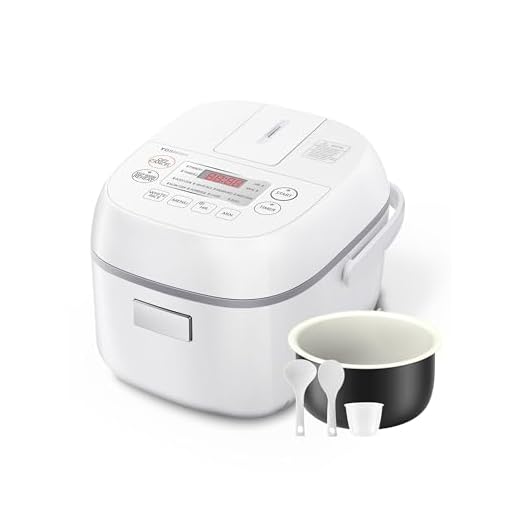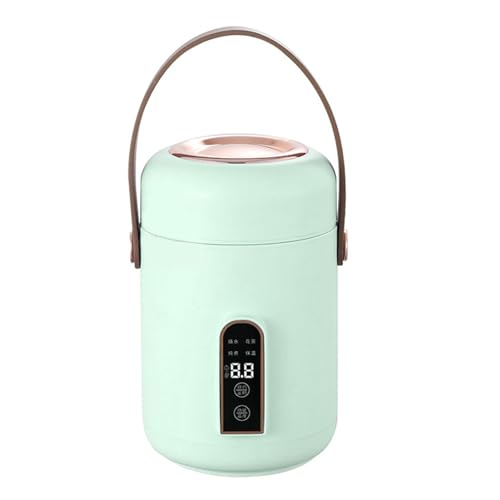



When it comes to cooking rice, many people wonder if using a rice cooker is more energy efficient than using a traditional stove. Rice cookers have gained popularity in recent years due to their convenience and ease of use, but are they really more energy efficient?
The answer to this question is not as straightforward as it may seem. While rice cookers do use electricity to cook rice, they are designed to be highly efficient and use minimal energy compared to cooking rice on a stove. Rice cookers have a built-in thermostat that automatically shuts off the heat once the rice is cooked, which helps to conserve energy.
Another factor to consider is the insulation of the rice cooker. Most rice cookers are insulated to retain heat, which means that once the rice is cooked, the cooker can keep it warm without using any additional energy. This is especially beneficial if you need to keep the rice warm for an extended period of time.
Additionally, rice cookers often have a non-stick inner pot, which helps to distribute heat evenly and reduce the cooking time. This further contributes to their energy efficiency compared to cooking rice on a stove, where heat may be wasted or unevenly distributed.
Overall, while individual rice cookers may vary in their energy efficiency, most modern rice cookers are designed to be more energy efficient than cooking rice on a stove. They are specifically engineered to use minimal energy and are equipped with features such as automatic shut-off and insulation to conserve energy. So, if you cook rice frequently and want to save on energy costs, investing in a rice cooker may be a good choice for you.
Comparing Energy Consumption
When it comes to energy consumption, rice cookers and stovetops differ in their efficiency. Rice cookers are known for their ability to cook rice without constant monitoring, which makes them more convenient for many users. However, this convenience comes at a cost in terms of energy usage.
A rice cooker typically requires an average of 400-900 watts of power to cook rice, depending on its size and functionality. On the other hand, a stovetop burner uses around 1,000-1,500 watts of power when boiling water to cook rice. In terms of energy consumption, rice cookers can be more energy-efficient compared to using a stovetop burner.
Energy Efficiency of Rice Cookers
Rice cookers are designed to provide consistent heat throughout the cooking process, which helps to reduce energy waste. They use a combination of direct heat, steam, and a thermostat to maintain the desired cooking temperature. Once the rice is cooked, the rice cooker will automatically switch to a “keep warm” mode, which consumes less energy compared to the cooking mode.
Furthermore, rice cookers are insulated, which helps to retain heat and minimize heat loss during the cooking process. This insulation contributes to their energy efficiency since less energy is required to maintain the desired temperature.
Stovetop Burner Efficiency
When using a stovetop burner, energy loss occurs due to heat escaping from the pot and burner. Unlike rice cookers, stovetops lack insulation and require constant monitoring to prevent the rice from boiling over or burning. This constant adjustment and checking lead to higher energy consumption, as the burner needs to be turned on and off to control the heat source.
In addition, stovetop burners distribute heat unevenly, which can result in wasted energy. The heating elements may only partially come into contact with the pot, leading to uneven cooking and energy loss. This inefficiency further contributes to the higher energy consumption of stovetop cooking.
| Method | Energy Consumption (watts) |
|---|---|
| Rice Cooker | 400-900 |
| Stovetop Burner | 1,000-1,500 |
Overall, rice cookers can be considered more energy-efficient than stovetop burners for cooking rice. Their insulation, consistent heat distribution, and “keep warm” mode help to minimize energy usage. However, it is important to note that individual energy consumption may vary depending on the specific rice cooker model and cooking time.
Benefits of Using a Rice Cooker
Using a rice cooker has numerous benefits, making it a must-have kitchen appliance for every household. Here are some of the advantages of using a rice cooker:
1. Convenience and time-saving:
A rice cooker is extremely convenient to use. It simplifies the cooking process by automatically controlling the cooking time and temperature, allowing you to set it and forget it. This means you can go about your other household chores or spend quality time with your family while the rice cooker takes care of cooking perfect rice.
2. Consistently cooked rice:
When cooking rice on a stovetop, it can be challenging to achieve consistent results every time. With a rice cooker, you can say goodbye to undercooked or overcooked grains. The cooker uses a built-in thermostat to regulate the cooking temperature, ensuring perfectly cooked rice with a fluffy texture every time.
3. Versatility:
While rice cookers are primarily designed for cooking rice, many modern models offer additional cooking functions, making them versatile kitchen appliances. Some rice cookers can steam vegetables, make soups, or even bake cakes. This versatility allows you to prepare a variety of dishes using just one appliance, saving you both time and effort.
Overall, a rice cooker is not only energy efficient but also a time-saving and convenient kitchen tool that produces consistently cooked rice. With its versatility, it is an excellent addition to any kitchen.
Factors to Consider
When comparing the energy efficiency of a rice cooker to other cooking methods, there are several factors to consider.
Cooking Time
The cooking time of a rice cooker is typically shorter than other methods such as stovetop cooking. This means that the rice cooker uses energy for a shorter duration, potentially reducing overall energy consumption.
Insulation
The insulation of a rice cooker is an important factor to consider. A well-insulated rice cooker can retain heat more effectively, requiring less energy to maintain the desired temperature during the cooking process.
Cooking Capacity
The cooking capacity of a rice cooker can vary. Larger rice cookers may require more energy due to their larger volume and higher cooking power. It is important to choose a rice cooker that suits your cooking needs to avoid energy wastage.
Note: Keep in mind that rice cookers are designed specifically for cooking rice and may not be suitable for other types of food. It is important to consider your overall cooking needs and energy consumption when deciding on a cooking method.
In conclusion, while a rice cooker may be more energy efficient compared to certain cooking methods, there are several factors to consider. The cooking time, insulation, and cooking capacity of the rice cooker can all impact its energy efficiency. Ultimately, choosing the right rice cooker for your needs and being mindful of your energy consumption can help you make the most energy-efficient cooking choices.
Tips for Maximizing Energy Efficiency
When using a rice cooker, there are several tips you can follow to maximize energy efficiency and reduce electricity consumption:
1. Measure the rice accurately
Using the right amount of rice will ensure that the rice cooker does not use excessive energy. Measuring the rice accurately will help prevent energy waste and save electricity.
2. Soak the rice
Soaking the rice for about 30 minutes before cooking can help reduce the cooking time and, therefore, save energy. Soaking softens the rice, allowing it to cook faster and using less electricity.
3. Use the right cooking setting
Most rice cookers come with different cooking settings for different types of rice. Make sure to select the appropriate setting for the type of rice you are cooking. Using the correct setting will ensure that the rice is cooked efficiently and with minimal energy consumption.
4. Cook multiple dishes at once
If your rice cooker comes with a steamer basket, take advantage of it by cooking other dishes along with the rice. This maximizes the use of energy and reduces the overall cooking time, as you are utilizing the same heat source for multiple dishes.
5. Keep the lid closed
Once you have started cooking the rice, avoid opening the lid unnecessarily. Opening the lid releases heat and extends the cooking time, resulting in more energy consumption. It is best to keep the lid closed until the rice is fully cooked.
By following these tips, you can maximize the energy efficiency of your rice cooker and reduce your electricity usage while still enjoying perfectly cooked rice.
FAQ
Is a rice cooker more energy efficient than cooking rice on the stove?
Yes, a rice cooker is generally more energy efficient than cooking rice on the stove. Rice cookers are designed to cook rice using minimal energy and to maintain a consistent temperature throughout the cooking process, which helps to reduce energy waste.
How much energy does a rice cooker consume?
The energy consumption of a rice cooker varies depending on the model and size. On average, a standard rice cooker consumes around 400 to 700 watts of power. However, newer models with advanced features may have different energy consumption levels.
Can using a rice cooker save money on electricity bills?
Yes, using a rice cooker can help save money on electricity bills. Rice cookers are designed to cook rice efficiently and effectively, using minimal energy. Compared to cooking rice on the stove, where heat can escape and energy can be wasted, using a rice cooker can result in lower energy consumption and thus lower electricity bills.
Are there any disadvantages to using a rice cooker in terms of energy efficiency?
While rice cookers are generally more energy efficient than cooking rice on the stove, there are a few potential disadvantages. Some rice cookers may take longer to cook rice compared to the stove, resulting in slightly higher energy consumption. Additionally, certain rice cookers may have additional features like keep-warm functions that use energy to maintain the cooked rice at an optimal temperature, which can increase overall energy usage.
Can I use a rice cooker to cook other foods apart from rice?
Yes, many rice cookers have multiple settings and can be used to cook various types of foods apart from rice. They can be used to steam vegetables, cook porridge, make soups, and even bake cakes. However, it’s important to note that the energy efficiency of using a rice cooker for these other foods may vary, so it’s always best to refer to the specific instructions and guidelines provided by the manufacturer.










